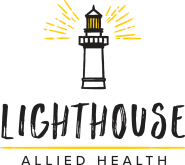Shared from the 8/20/2023 Sydney Morning Herald eEdition¹
Lighthouse Allied Health specialises in psychosocial functional assessments for its NDIS clients.
After 16 years as a mental health nurse, Cassandra Eaton was keen for change.
Six years ago, she created Lighthouse Allied Health, using her skills to support clients in a new way under the National Disability Insurance Scheme (NDIS).
Eaton, a psychiatric rehabilitation specialist, joined forces with best friend Jo Fellows, a mental health social worker who manages the behavioural support team.
Together, they have more than 30 years’ experience in clinical mental health.
“We’re used to working in mental health and extremely aware of the very limited places for people with mental health issues to get packages for appropriate support,” Eaton explains. “The NDIS opened up the door for all of them to have an opportunity to access holistic support they hadn’t previously had access to, so we feel we’re the pioneers in that area.”
The service began in Newcastle and will soon serve the Central Coast and Sydney.
Importantly, Lighthouse Allied Health is now expanding to also support clients with all types of disabilities.
“We initially focused on mental health, which is pretty much unheard of in the disability sector,” Eaton says. “Normally, if you want access to a mental health clinician or … support, you must have a hospital admission, which is even harder to get now.” The NDIS provider specialises in psychosocial functional assessments to gauge the support and therapies clients need. “It’s basically having somebody who understands the link between mental health and psychosocial disability,” Eaton explains. “It places us in a position where we can provide clients with a specialised service they weren’t getting anywhere else. “We’re able to reflect that in our reports, so we can advocate for our clients to get funding, otherwise they get overlooked.”
Having allied staff who specialise in mental health means they understand not only the complexity of symptoms, but also the cognitive impact and effect on daily functioning.
Crucially, the service helps clients achieve their identified recovery goals by improving their independence.
Whether it’s helping people engage in healthy relationships, find a job or stable housing, be socially active, manage budgets or simply eat and sleep better, it’s made an “enormous difference” to their quality of life.
“Some of our clients who would never have been able to gain employment can now work,’’ Eaton says. ‘‘They’ve had ongoing therapeutic support to help them to address any barriers they may have.
“It changes people’s lives, having ongoing regular support with somebody they can trust, who’s not after something from them, who is basically an advocate for them, and has therapeutic skills and a comprehensive understanding about mental health.”
According to Fellows, this social support helps clients succeed and diverts them from the stressed acute mental health system.
“It validates to them that they’re not stuck in that ongoing cycle of admission, discharge, readmission,” she says.
In addition to in-home services, Lighthouse Allied Health offers Telehealth appointments and assessments.
The service is currently recruiting allied health sub-contractors as it expands to serve all disability groups. Contractors are also being sought in rural areas.
“We love what we do – we’re very passionate and we love our clients,’’ Eaton says.
‘‘We feel like this is the biggest opportunity they’ve ever had.”

